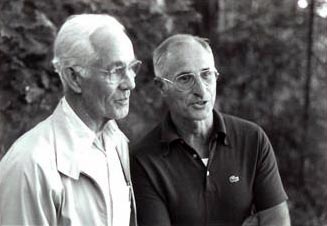
Dr. Hays (right), with colleague William Doyle.Richard M. Hays, MD, professor emeritus of medicine at Albert Einstein College of Medicine, died Thanksgiving morning in Greenwich, CT. He was 85.
A graduate of Harvard College (anthropology) and the Columbia College of Physicians and Surgeons, Dr. Hays completed a residency in Internal Medicine at Beth Israel, Boston, and renal research training at the Massachusetts General Hospital.
He joined Einstein's faculty in 1960. During his tenure at Einstein, he was director of the Division of Nephrology at Einstein from 1979 to 1988, and trained and/or recruited such academicians as Detlef Schlondorff, Christos Carvounis, Pravin Singhal, Nick Franki, and Sherman Levine. After his research career was completed, he took over the Einstein Renal Course and led it to consistently rave reviews by the students.
He also served as director of the Mt. Desert Island Biological Laboratory in Salisbury Cove, Maine, a hotbed of renal physiology research.
Dr. Hays made major contributions to our understanding of the mechanisms of osmotic water flow and the response to antidiuretic hormone in the kidney collecting duct. He published two landmark papers in the prestigious Journal of General Physiology with Alex Leaf of Harvard's Mass General Hospital. The first of these established the toad urinary bladder as a model system for the ADH response. The second established that the apical membrane is the barrier to water flow, that ADH acts from the basolateral membrane, and that there must exist osmotic water pores with a clear selectivity. These studies laid the groundwork for the subsequent discovery of the aquaporins, for which Peter Agre won the Nobel Prize.
His subsequent work explored inhibitors of water pores, the ultrastructural nature of pores, and the process of membrane recycling. Much of this work dovetailed with contemporaneous work on water pores by Alan Finkelstein at Einstein.
Dr. Hays grew up sailing with his brother David, improving through the generations with his nephew Dan. Perhaps this exposure to the molecule covering 70% of the planet accounted for his scientific interests in water.
"Dick had a twinkle," said Dr. Victor Schuster, Chairman of the Department of Medicine. "I recall sitting next to him at a renal division journal club during the presentation of an article about generating very long-lived mice. At one point, he leaned over to me and began to sing in a good imitation of the character 'Sportin' Life' in the Gershwin's 'Porgy and Bess': 'But who calls dat livin' when no gal'll give in, To no mouse what's nine hundred years.'"
Dr. Hays is survived by his wife, Susan Pope Hays; his children Laurie, David, John, and Susannah; his six grandchildren; and his brother David.
A memorial service for Dr. Hays will be held Thursday, January 3rd at 4:00 P.M, Temple Shalom, 300 East Putman Avenue, Greenwich, CT.